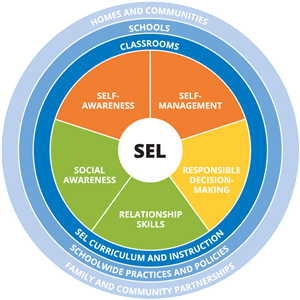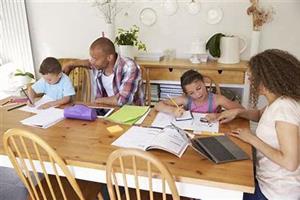- Everett Public Schools
- Resources
Student Support Services
Page Navigation
-
What is SEL?
 Social and emotional learning (SEL) is a process through which adults and children learn to recognize and manage emotions, demonstrate care and concern for others, develop positive relationships, make good decisions and behave ethically, respectfully, and responsibly.
Social and emotional learning (SEL) is a process through which adults and children learn to recognize and manage emotions, demonstrate care and concern for others, develop positive relationships, make good decisions and behave ethically, respectfully, and responsibly. Why is SEL important?
Our emotions play a strong role in influencing our motivation, ambitions, confidence, and our interactions with others. As students grow in their ability to understand and regulate their emotions, they also increase their ability to perform academically, engage in positive relationships, problem-solve effectively, empathize with others, and take risks in their learning. It is through developing strong social and emotional skills that students emerge from school life ready and willing to engage in a global society.What is our SEL mission?
We strive to become a district where stakeholders are invested in the social, emotional, behavioral, and academic success of ALL students. Within Everett Public Schools, we focus on building relationships and the capacity for adults to create a positive, welcoming, and healthy environment where students feel known and valued. We want all students to experience high quality instruction through engaged learning in a safe and supported environment.How does Everett Public Schools provide direct instruction in SEL?
 Everett Public Schools provides direct instruction in Social and Emotional Learning (SEL) via Second Step curriculum to all students through 8th grade. Second Step curriculum is aligned to both the nationally recognized Collaborative for Academic, Social and Emotional Learning (CASEL) and the Washington State Social and Emotional Learning Standards adopted by the Office of the Superintendent of Public Instruction. Second Step K-5 curriculum provides grade appropriate instruction across four units of study that focus on developing: Skills for Learning, Empathy, Emotion Management, and Problem Solving. During remote learning, students will have direct instruction using Second Step each day.
Everett Public Schools provides direct instruction in Social and Emotional Learning (SEL) via Second Step curriculum to all students through 8th grade. Second Step curriculum is aligned to both the nationally recognized Collaborative for Academic, Social and Emotional Learning (CASEL) and the Washington State Social and Emotional Learning Standards adopted by the Office of the Superintendent of Public Instruction. Second Step K-5 curriculum provides grade appropriate instruction across four units of study that focus on developing: Skills for Learning, Empathy, Emotion Management, and Problem Solving. During remote learning, students will have direct instruction using Second Step each day. As students enter middle school - becoming both more independent and socially aware - they require specific support in developing healthy relationships with peers and managing increasingly complex problems. In middle school, Second Step curriculum emphasizes: Mindsets and Goals, Values and Friendships, Thoughts, Emotions and Decisions, and Serious Peer Conflicts. During remote learning, students will have direct instruction using Second Step at least every other week.
 All of our middle schools and high schools, will begin training and an implementation process over this coming school year with RULER, an SEL approach developed by the Yale Center for Emotional Development. RULER is an acronym for Recognizing, Understanding, Labeling, Expressing, and Regulating emotions (the “RULER” skills). RULER implementation involves systematic professional development for the adults involved in the education of children (school leaders, teachers, support staff, and adult family members) so that emotions become central to learning, teaching, and parenting.
All of our middle schools and high schools, will begin training and an implementation process over this coming school year with RULER, an SEL approach developed by the Yale Center for Emotional Development. RULER is an acronym for Recognizing, Understanding, Labeling, Expressing, and Regulating emotions (the “RULER” skills). RULER implementation involves systematic professional development for the adults involved in the education of children (school leaders, teachers, support staff, and adult family members) so that emotions become central to learning, teaching, and parenting. Is SEL the same for everyone?
Everett Public Schools uses a tiered approach to supporting Social and Emotional Learning. All students receive the similar elements of SEL instruction in the classroom, and these are called Tier 1 or "universal supports." When some students need supports in addition to those at Tier 1, they will receive targeted help that is sometimes delivered in small groups. These are Tier 2 supports. A few students will need more intensive supports that are specific to their individual circumstances which might also be delivered over an extended time. Support at this level is called Tier 3.Students can be referred for supports beyond those at Tier 1 by a friend, parent. teacher, counselor or other staff member familiar with the student's needs.
What is provided when students need more SEL supports?
 Some students will receive additional support to help address emotional regulation, conflict and anxiety. These students will receive additional supports via the school counseling team that will include strategies self-calming, emotional regulation and conflict/anger management. These supports will be delivered by the counselor via Social and Emotional groups of 3 to 5 students. This year, Everett will be partnering with the UW Smart School to train select school counselors on individuals supports to meet the needs of individual students using Cognitive Behavior Therapy. CBT strategies will help select student engage in problem-solving and to adjust their thinking so that they can adapt more readily to situations outside of their control.
Some students will receive additional support to help address emotional regulation, conflict and anxiety. These students will receive additional supports via the school counseling team that will include strategies self-calming, emotional regulation and conflict/anger management. These supports will be delivered by the counselor via Social and Emotional groups of 3 to 5 students. This year, Everett will be partnering with the UW Smart School to train select school counselors on individuals supports to meet the needs of individual students using Cognitive Behavior Therapy. CBT strategies will help select student engage in problem-solving and to adjust their thinking so that they can adapt more readily to situations outside of their control. Schools have various staff members such as Family Advocates, Intervention Specialists, and other support staff who are trained in providing short-term supports for students experiencing a variety of difficulties in their lives.
How is SEL integrated into the school environment?
Climate and Culture play a significant role in supporting student social and emotional well-being and development. To that end, each of our schools develop systems to set school-wide norms and routines so that everyone feels welcomed and valued. Within this framework, schools create school-wide expectations that are clear and consistent across the entire school. Adults intervene to help kids understand and contribute to school-wide expectations, and students are acknowledged regularly. Successful implementation has been proven to increase student sense of belonging and foster a culture of care among students and staff.How is SEL success measured?
 Each school utilizes Panorama as a survey to measure student self-perception within key SEL components such as Sense of Belonging, Social Awareness and Growth Mindset. Schools use this comprehensive data to plan activities and acknowledgments to foster a more positive school environments. During remote learning, schools will be adapting their school-wide expectations to a virtual environment and will plan online school-wide activities that promote sense of community, belonging, and school pride.
Each school utilizes Panorama as a survey to measure student self-perception within key SEL components such as Sense of Belonging, Social Awareness and Growth Mindset. Schools use this comprehensive data to plan activities and acknowledgments to foster a more positive school environments. During remote learning, schools will be adapting their school-wide expectations to a virtual environment and will plan online school-wide activities that promote sense of community, belonging, and school pride. Next Steps...
Adult professional development around social and emotional learning is critical for student success. Students learn best from adults with strong personal social and emotional competencies. Since schools went online last March, Everett teachers and staff have been learning strategies to monitoring and improve their own social and emotional competences using the Big 7 Strategies for Being your Best Self from Dr. Marc Brackett, the Director of Yale's Center for Emotional Development. When applied personally and collectively within classrooms, the Big 7 Strategies can not only support healing during this pandemic but also develop practical and helpful habits for a lifetime of well-being.As we prepare our staff for a more enhanced remote learning environment, staff will be supported in their implementation of SEL strategies emphasized in the first three modules of the "Distance Learning Playbook," a resource provided to EPS teachers. These include a focus on aimed at developing self-care strategies, classroom agreements and expectations, routines, and teacher-student relationships.
Are there SEL resources for families?
 During these challenging times of remote learning and often remote working scenarios, it can be helpful to develop what is called a "Family Charter" to get your family on the same page and create a more respectful home. A written agreement that everyone in the family creates together and signs, the Family Charter helps build a positive emotional climate in your home. It consists of 3 simple questions:
During these challenging times of remote learning and often remote working scenarios, it can be helpful to develop what is called a "Family Charter" to get your family on the same page and create a more respectful home. A written agreement that everyone in the family creates together and signs, the Family Charter helps build a positive emotional climate in your home. It consists of 3 simple questions: - How do you want to feel at home as a family?
- What can we each do in order to have those feelings more often?
- How will we handle conflicts when they arise?
The process of creating a charter begins by asking all family members to make a list of feelings they want to experience while spending time with the family. Once your family identifies the feelings everyone would like to experience, discuss what behaviors everyone can commit to displaying that will consistently promote and support those feelings. Last, the family decides on guidelines for how to deal with conflict or negative feelings.
If you would like to learn more, you can click to read more or watch a video (from the Yale Center for Emotional Intelligence).

